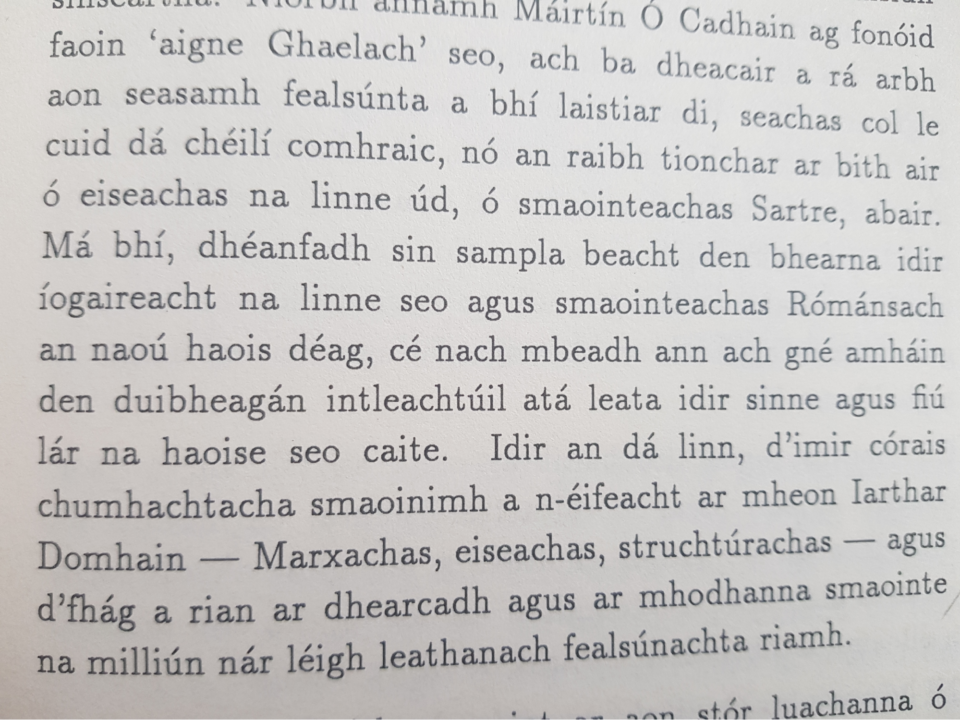“A prophet is not without honour except in his home territory and among his own relatives and in his own home.” Mark 6:4
There are a number of Irish people of the recent past of whom that might have been said. Monsignor Breandán Ó Doibhlin, who passed away on September 19 at the fine old age of 92, was certainly among them.
Few Irish people have been recognised as an Officier de la Légion d’Honneur, but Ó Doibhlin received that honour, as the former Rector of the Irish College in Paris, for his contribution to French and Irish scholarship. He was a true European intellectual steeped in the traditions of Gaelic and French literature and their connections to the European tradition of which Gaelic Ireland was a crucial element for over a thousand years before the suppression of Gaelic society by the English colony.
He is probably best known for his academic career, most notably in Maynooth where he was a Professor of French and Modern Languages for many years and among whose peers were another fine patriot Gael, the late Cardinal Tomás Ó.Fiach. He published extensively on many topics and also wrote fiction including two groundbreaking novels, Néal Maidine agus Tine Oíche (1964) and An Branar Gan Cur (1979), and his final work of fiction, Sliocht ar Thír na Scáth (2018), which is set during the Nine Years War in his native Tyrone.
Néal Maidine is subtitled a ‘fáithscéal,’ or parable, which Micheál Mac Craith has compared to the Greek epic Odyssey. It is told by an anonymous narrator who leads his people through stages of exile, battle and reconquest ending in a freedom that it is stressed will only be maintained if the race keeps strong its traditions and faith and love and respect for their land and their ancestors.
If one is looking for a concise summary of where Ó Doibhlin stood on issues pertaining to the future of the nation, then a slim pamphlet, Cosaint na Daonnachta published in 2004, is a good source. In it Ó Doibhlin reprises some of the themes he addressed in his fiction, the core message being that we as a people are in danger of losing our identity and grasp on our own and the western tradition, and that the placing of our own language at the centre of Irish life must play a central part not only in the defence, cosaint, of that tradition but in their strengthening.
Ó Doibhlin reflects on how economic globalisation or neoliberalism, although he uses neither term himself, was making every facet of life subservient to the metrics of accountancy and which was undermining “an daonnachas Chríostaí ba bhun lenár saol agus lenár síbhialacht,” – the Christian humanism that forms, or used to form, the basis not only of Irish life but of the broader western civilisation.
The undermining of that tradition has left Irish people prey to all sorts of faddish notions that have nothing whatsoever to do with our history or indeed the things that are vital to preserving and sustaining a viable community rather than a random collection of economic factors. That goes to the heart of what constitutes the “aigne Gaelach” and which Ó Doibhlin claimed had been distorted by ideas which influenced millions even those who had never read a page of philosophy in their lives.

That has left the Irish people rudderless and increasingly adrift from their roots, much like the allegorical tribe dispossessed and forced into exile in Ó Doibhlin’s first novel. This process has, of course, been greatly facilitated by the fact that Irish people for the most part are cut off from their own language and from the millennia old culture whose key is through knowledge of our own language, and especially of our own literary and oral tradition in Irish.
The strengthening of the language and its daily use by more people is a central part of any project to conserve what we have and if possible to lay the basis for a revival of Irish culture and the Irish intellectual tradition within the wider living European tradition, which is similarly under threat.
It is easier for those European countries outside of the Anglosphere to preserve what they have because English is the lingua franca of global capital and its cultural superstructure. Ó Doibhlin mentions a critical mass of 15% of the population having Irish as their first language as the basic level referred to by sociolinguists as the point at which a language has an effective influence on the broader society. Ireland as a whole is a good distance away from achieving that even after a century of political independence in the greater part of the island.
Ó Doibhlin returned to part of that theme, but with a more faith focused approach, in a piece he wrote in English for the Furrow in January 2007. In it he made the valid point that, unless Ireland has a definite sense of itself and its own values, a “multi-culturalism” based on the “maintenance unchanged of alien ways of life in our community” would set us “on the road to ghettoization and a further deliquescence of our already impoverished ethos”. He was writing at a time when the impact of mass immigration was just beginning to be felt.
Whether Ó Doibhlin and others who have addressed the same subject like the late Des Fennell share the fate of prophets in their own land, or whether that impoverished ethos can be restored is up to ourselves.